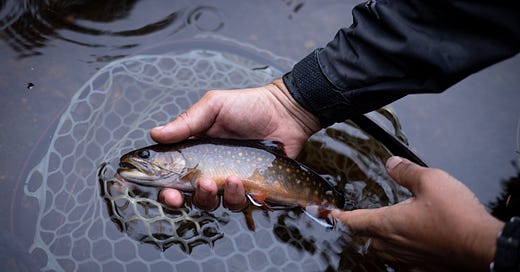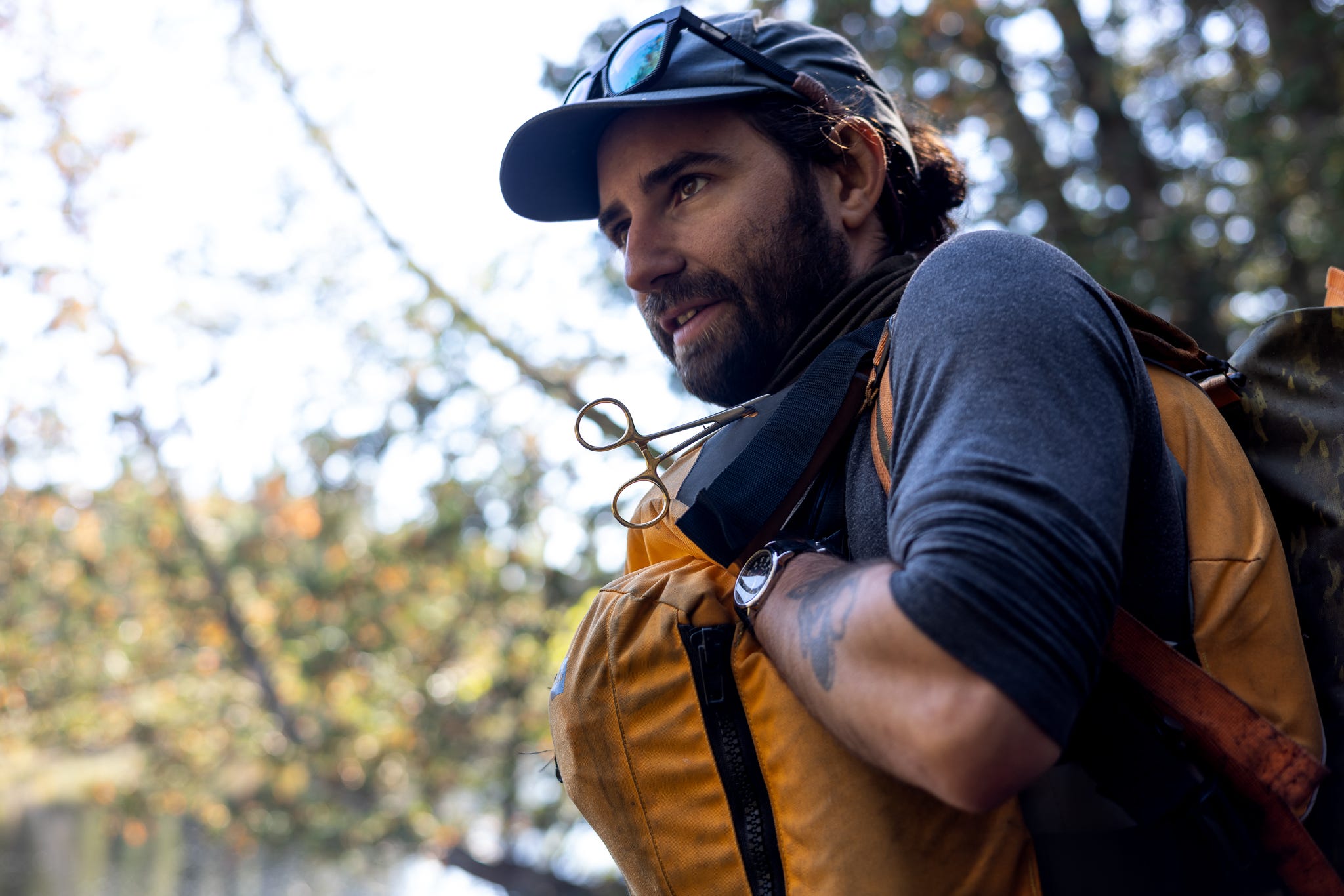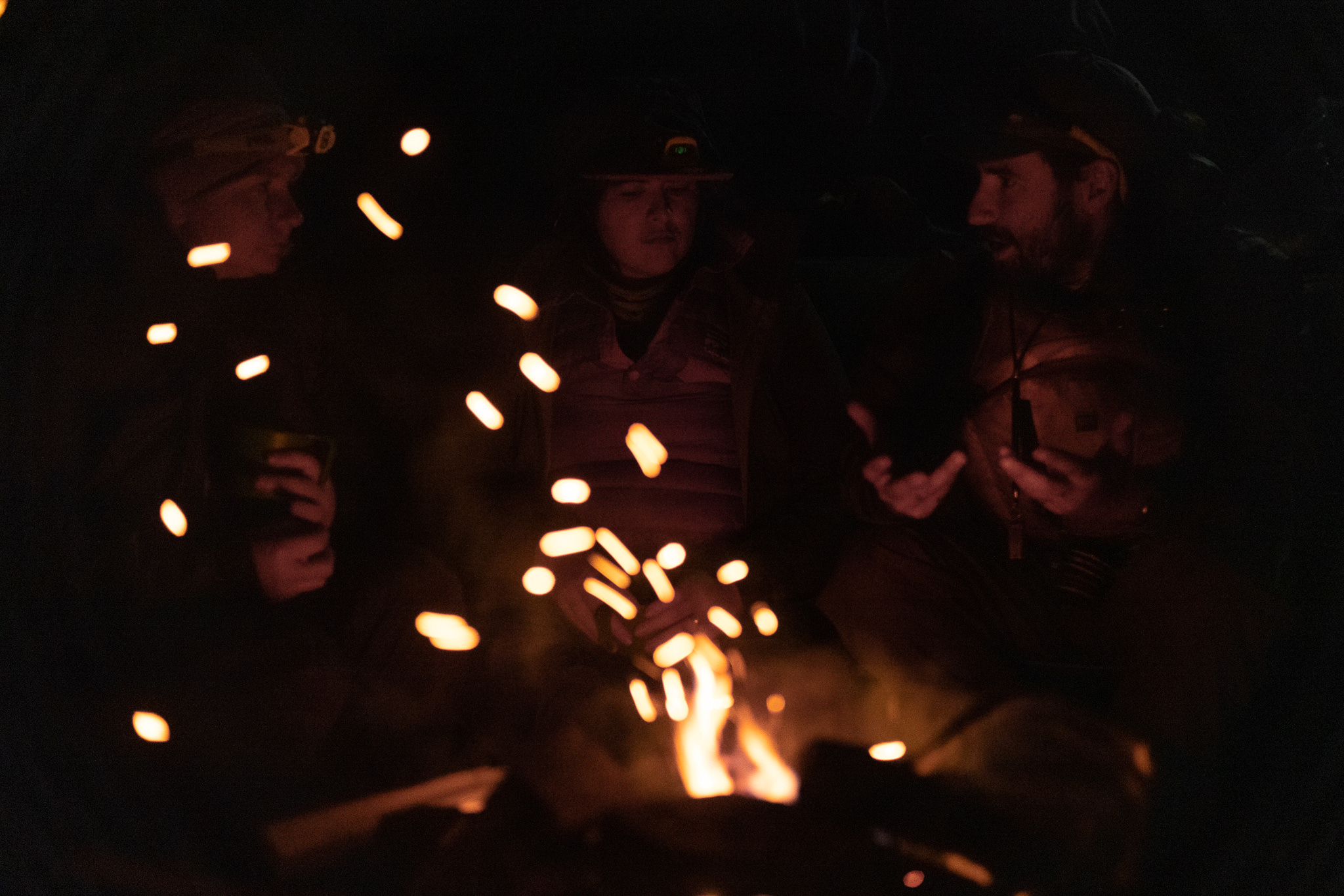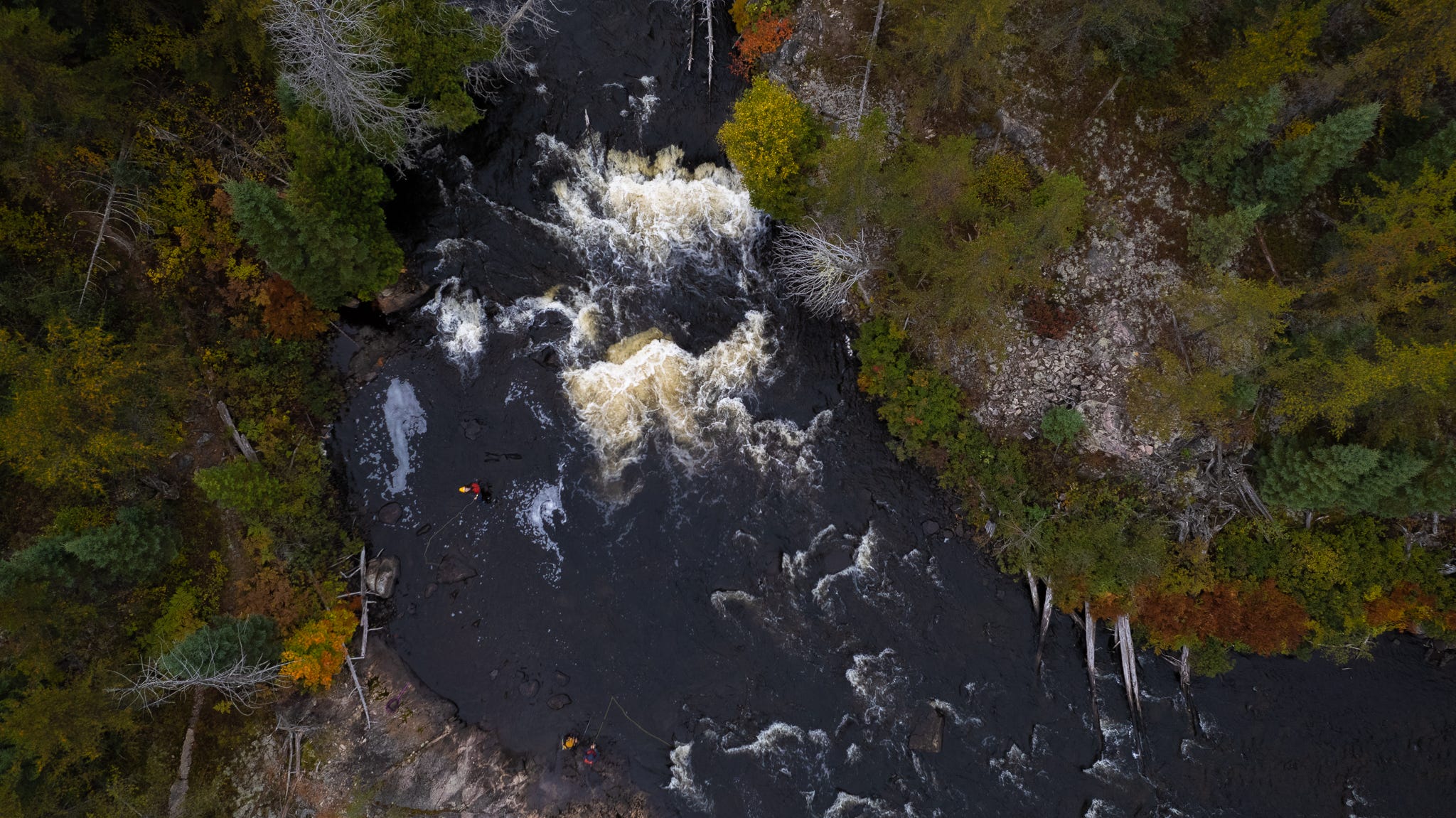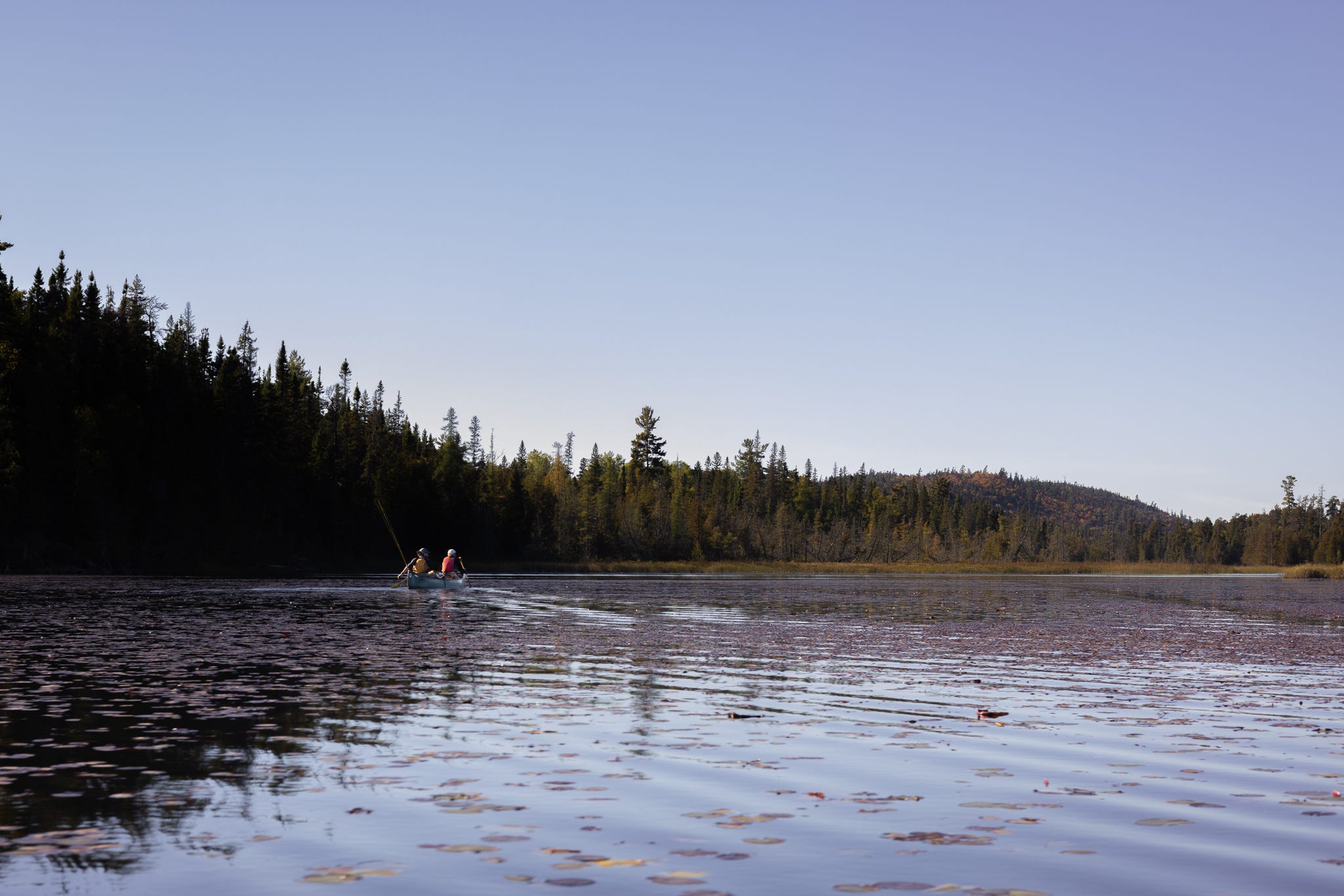Steward of the Lady Evelyn Brook Trout
How Aldo Pescatore-Tardioli cares for the rivers he fishes
Aldo Pascatore-Tardioli runs across the wet rocks in his waders, net in hand, with eyes fixed on a spot in the river where fishing line enters the water. He reaches it, drops to his knees, and nets the fish: a brilliantly coloured red-spotted brook trout. There are smiles all around. He proudly congratulates his client. It’s her first fish of the trip.
With long, wavy, dark locks pouring out of his toque, tattoos all over, and a disheveled beard, Aldo looks wild, as though he belongs on the river. Quite frankly, he does. He’s just spent the last three weeks guiding clients through the northern section of the Lady Evelyn River in the remote backcountry of Temagami, Ontario. According to Erik Fenkell, co-owner of Temagami Outfitting Co. and Aldo’s business partner on these trips, Aldo probably knows this section of river better than anyone else on Earth.
This is his last trip of the season. Every year through “So Fly,” a fly-fishing media production company that he runs alongside Mitch Duesling and Yilma Cambell (two anglers in the advertising world), Aldo teaches the art of fly fishing to people from all across Canada.
A wilderness area over half the size of Belgium, the Temagami backcountry provides the perfect setting: a cold northern river that’s been home to generations of brook trout, affectionately referred to as “brookies” by anglers everywhere, for millennia.
“There's so much history here,” Aldo says while watching his clients cast into the foamy waters downstream of the rapids. “Every time you catch a brook trout, you’re holding in your hand 10,000 years of genetic history. That’s a native fish for us. That’s a wild fish. This ecosystem has been doing its thing forever.”
One of Aldo’s clients casts a hopper dropper (two flies tied onto the same line to create the illusion of food both above and below the water’s surface). The fly lands and suddenly the line is pulled tight. “Heck yeah!” Aldo yells followed by a goofy belly laugh full of excitement. He runs over with a net to help land the fish. It’s a tiny brook trout.
He takes a photo of his client with her fish and releases it back into the Lady Evelyn river.
“It’s good to see small fish and fish of variable sizes in the river,” he shares. “That way it shows the regeneration of the species.”
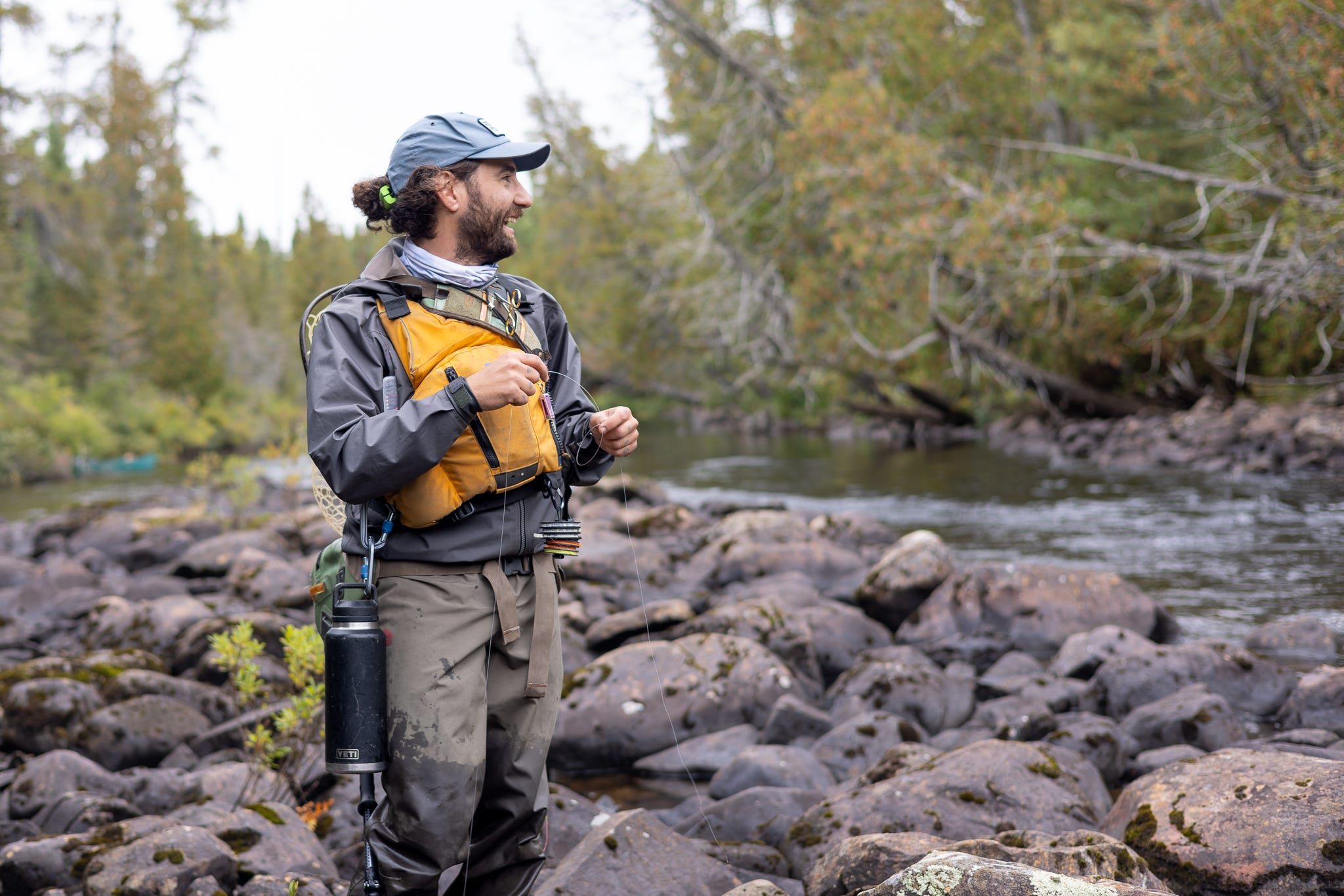
The sun is beginning to get lower in the sky. It’s time to make our way back to our campsite, a small clearing on the side of the river marked with an orange sign pegged to a tree. While we enjoyed running the canoes down the rapids on our way to this particular spot, the way back meant we would be lining the canoes (pulling them with either a tow-rope or by hand up the rapids) to avoid throwing them over our heads and walking through the trails (portaging).
We begin to line the canoes. Aldo reaches his hand down into the water. He picks up something shiny. A piece of trash left behind by someone that had found its way into the river.
We reach our campsite. The sun is setting. Aldo’s clients are setting up their tents. He whispers to me that he’s going to take a few minutes to himself to fish and disappears onto the rocks, rod in hand. He switches the fly on his line for another one. To him, it seems obvious, but I don’t understand why.
“I think through fishing…at least fly fishing, you start to understand not only how to imitate food, but what food is,” Aldo tells me. “That could be insects, it could be bait fish, it could be all sorts of different kinds of forage. You start understanding not only the fish you’re trying to fish for, but the food they’re trying to eat.”
In four-minutes of what can only be described as poetry-in-motion-in-waders, the rod bends. Aldo has a fish on the hook. I run down with the net and pass it to him. He lands the fish. It’s another brook trout.
He wets his hands before handling the fish. After snapping a few photos Aldo says, “I’m putting it back. I don’t want to keep it out of the water too long.” He releases the fish back into the river.


As the sun sets I make a fire. We’re all huddled around it in order to stay warm. It’s the coldest night of our five-days in the backcountry. Without screens to distract us, all we have for entertainment is each other, and the conversation shifts to fishing stories, something Aldo has no shortage of.
Aldo shares with us that he lived in his vehicle and traveled across the American west in order to take a few months off his hectic life in the restaurant business in Toronto, Ontario and fly fish wild rivers. His travels landed him as a guest on the So Fly podcast where he met Mitch and Yilma. They hit it off, and Aldo was inducted into the group.
Through So Fly, Aldo has traveled all over the world to fish, meeting guides and other anglers who’ve passed on their knowledge and tips making him the angler he is today.
Aldo is asked the location of his favourite place that he’s ever fished. He has to think about it, then shares a story of fishing for Atlantic salmon in the Gaspé Peninsula.
“I was holding onto an Atlantic salmon and I didn’t want to let it go. This fish has been doing its thing for thousands of years,” he recalls. He drops his head slightly. “It was sad.” His story reminds him of an upcoming trip. After he finishes guiding us on the Lady Evelyn river, he’s heading to British Columbia to fish for Pacific salmon for the first time.
“I’ll probably cry,” Aldo says when asked what he’ll do when he catches one. He pauses “I feel like there’ll be a time when you can’t catch Pacific salmon again.”
The conversation shifts more so towards jokes as the bagged wine becomes depleted. While he’s a serious angler, Aldo isn’t a serious person. He loves to goof around. As the night ends his belly laugh rumbles through the trees.

As the sun rises we’re greeted by a bluebird day, a change of pace from the seemingly permanent overcast that followed us through the first few days of the trip. Aldo’s excited. He can see that the bugs are out, evidently enjoying the warmth of the sun.
“The river’s going to come alive.”
We pack up and make our way to a fishing spot on the river where Aldo’s found success over the years. Aldo’s clients each cast out a line as he and I portage all the gear around the rocks that they’re fishing on through a trail in the trees.
Temagami is home to one of the oldest still-in-use Indigenous trail networks in the world. These portage routes have been used for thousands of years with human activity in the region estimated to have started at least 8,000 years ago.
Aldo and I began speaking about how we both discovered the Temagami region.
“I first came to Temagami in 2017,” Aldo told me. “Erik [the co-owner of Temagami Outfitting Co.] spoke with such passion on our first trip here and that stayed with me. I really try to emulate that feeling when I’m on the river. You're in a pristine environment. There’s history. You just feel it all around you, whether it's in the trees or you feel it on the trail.”
After Erik introduced Aldo to the region, Temagami became the destination for So Fly’s guided trips every September. While most of their work comes in the form of sharing fishing stories through podcasts, photos and videos, being on the river with people has been one of the most rewarding experiences in Aldo’s opinion.
“Obviously we want to catch fish and see these wonderful, beautiful, wild brook trout, but if people can come back to the river [without a guide] and feel comfortable in the water and fishing, that's a real goal.”
I ask Aldo what’s the value of having more anglers on the river. Is there a benefit in increasing the amount of people who access these rivers?
“I think the saying is find it, love it, protect it,” Aldo shares.
Creating access to these spaces is something that’s important to Aldo, and something he does believe is beneficial. It’s important to him to make sure he’s providing access to people who historically have been underrepresented in the outdoors as well. One of the three guided trips he runs each year with So Fly and Temagami Outfitting Co. is reserved for Brown Girl Outdoor World, an organization founded by accomplished angler Demeisha Dennis to provide opportunity and access for the BIPOC community in the outdoors.
“I think if people discover these spaces and enjoy these spaces and feel comfortable in these spaces, they’ll want to protect these spaces.”
Access is only part of the equation. Twice this year, the So Fly Crew has hosted social events in the city of Toronto with all event proceeds going towards the Coalition For the West Credit River, a group dedicated to protecting the West Credit River and the native brook trout population. Threatened by the design of the Erin Wastewater Treatment Plant, these events brought Ontario’s anglers together to raise funds in the interest of the river and brook trout. Through these events they’ve raised approximately $6,000, providing an opportunity for Ontario’s fly fishing community to advocate for the ecosystem. Proven from his actions, Aldo believes access can lead to advocacy.
One of Aldo’s clients has a fish on the line. Once again he makes it in time to assist with the net. He helps her net another brook trout and releases it back into the river.
I ask him why he’s released every fish on this trip. I’m responsible for cooking during our five-days in the backcountry, so I’m curious as to why we haven’t kept, cleaned, and cooked any fish over the fire. He explains that he doesn’t have enough information about the population of brook trout in the Lady Evelyn River to know how keeping them will affect their numbers.
It’s clear that Aldo has a lot of respect for brook trout, and one of the reasons is because they’re an indicator species. Changes in their population, behaviour and health can indicate the health of the entire ecosystem.
“We’re losing cold water rapidly as the climate changes,” Aldo says. These [brook trout] are canaries in the coal mine. Hopefully by introducing people to the river they’ll want to protect it.”
Aldo pauses, realizing some form of irony in the conversation about protection. “It’s a hard thing to say when you’re skewering fish in the mouth with hooks,” he laughs.
“But I think for the most part it introduces people to the river, and rivers need advocates probably now more than ever. We can collectively be advocates for the places we love.”
His respect for the land and the wildlife that call it home is deeply apparent in every conservation I have with him. Sitting on the rocks, we both look out, watching his clients fish.
“I wonder if there’s a day where I won’t want to fish anymore,” Aldo says. “I think about that often.”
" width="640" height="272" frameborder="0" allowfullscreen></iframe>
Did you enjoy this story? The good news is, you can join in on the fun next year! Get in touch with So Fly here to look into booking for next year’s Lady Evelyn trips. You can also reach out to Temagami Outfitting Co. here.
Donate to Trout Unlimited Canada, a non-profit dedicated to the conservation, protection and restoration of Canada’s freshwater.
Support the Coalition For The West Credit River
Donate to Friends of Temagami, a non-profit all-volunteer environmental advocacy organization in Temagami.

